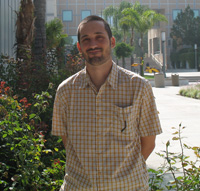IEEE Sensors Research Graduate Scholarship Awarded to Selected MAE Graduate Student
Max Perez chosen for his outstanding research in sensing technology
 Max Perez, a fourth-year Ph.D. student, was recently honored by the
Max Perez, a fourth-year Ph.D. student, was recently honored by the
Under the advisement of Andrei Shkel, associate professor of mechanical and aerospace engineering, Perez has been conducting research on inertial sensors that measure motion, such as acceleration or rotation. More specifically, he has been working on high precision accelerometer technology, which uses optical techniques to detect small changes in inertial sensors. Such technology could be used to detect small changes in movement in bridges and buildings.
Through his research, Perez has been able to develop technology to serialize sensors where a single optical source is able to detect movement in many sensors distributed over long distances, such as along a pipeline or over land. The sensing information is encoded to each wavelength of light, and individual colors represent the motion in each sensor. When the hue of the color alters, it implies that the sensor has also changed.
He presented his specific research in an academic paper titled, “Performance Trade-offs of an Interferometric Micro-g Resolution Accelerometer” at the 2006 Sensors Conference in Korea. His paper was also nominated as one of the top 10 student papers of the conference, giving him the additional opportunity to present his research to a panel of academic and industry leaders. Perez won the first runner-up award, and was given a $500 prize.
“I enjoyed this chance to interact with my colleagues in the field, and gain international exposure with competing sensor technologies,” Perez said.
He has been working with inertial sensors for the last four years at the UC Irvine Microsystems Lab, where his graduate student team has been focused on developing and advancing Micro-Electro-Mechanical Systems technology.
